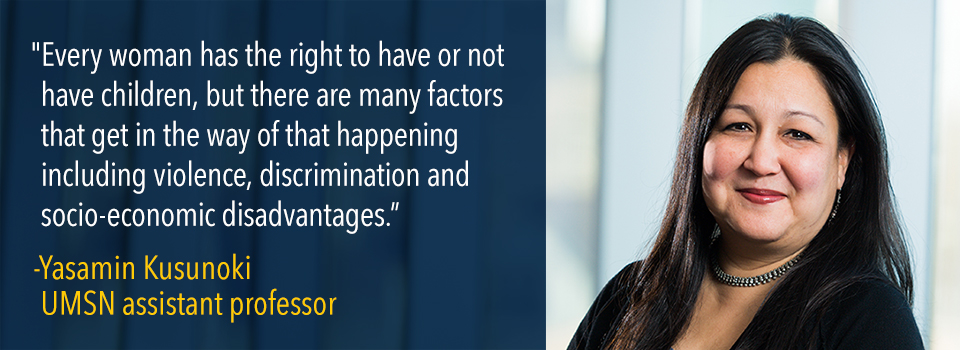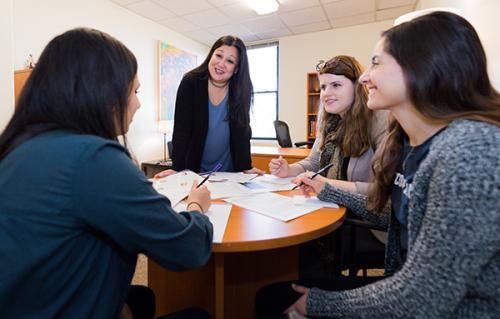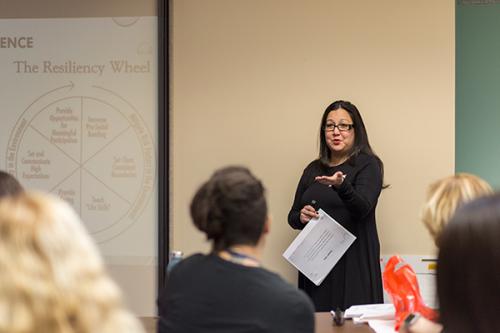Faculty impact: A champion for women and reproductive justice

Yasamin Kusunoki was a young girl growing up in California when she made an observation that stayed with her.
“I saw the power dynamics between boys and girls and that didn’t sit well with me,” she explained. “I come from a family of strong women, so whether it was on the playground or in a classroom, it bothered me when I saw girls not being treated equally.”
The disquiet carried into Kusunoki’s career, which is rooted in public health and sociology. She found herself drawn to research that examined the factors contributing to gender, racial and ethnic disparities.
Inspiration in research
One of Kusunoki’s earliest projects at the University of Michigan’s Institute for Social Research (ISR) provided new insights into the sources of these disparities, with a focus on unintended pregnancy.
 Kusunoki and her colleagues followed a diverse set of 18-19 year-old women for more than two years to gain a better understanding of connections between relationships, life aspirations and contraceptive use.
Kusunoki and her colleagues followed a diverse set of 18-19 year-old women for more than two years to gain a better understanding of connections between relationships, life aspirations and contraceptive use.
“We realized how much violence these women were experiencing, not just in their own intimate relationship, but their moms’, their sisters’, and friends’ relationships,” said Kusunoki.
The study reinforced a common finding that violence and unintended pregnancy were linked, but the researchers were also able to show something new.
“Because we had weekly data, we could see that the violence precedes the decreased contraceptive use,” she explained. “That kind of relationship is unhealthy for both parties, and then you’re potentially bringing a baby into a violent situation.”
The violence can also be linked to reproductive coercion.
“Reproductive coercion can happen in different ways, such as the men coercing their partners not to carry a pregnancy to term, contraceptive sabotage like a partner saying they are going to withdraw but not doing so, or throwing away birth control pills,” she said.
Reaching those who need help
“I loved sitting behind my desk analyzing data, but after seeing this, I felt I needed to do more,” said Kusunoki.
Kusunoki saw an opportunity to make a real-world difference in an area that she’s passionate about.
“For me, it’s about women and reproductive justice,” she said. “Every woman has the right to have or not have children, but there are many factors that get in the way of that happening including violence, discrimination and socio-economic disadvantages.”
Now Kusunoki is exploring new ways to reach women who need help but are afraid to ask for it or don’t know how to find it. She’s developing interventions to incorporate that assistance into health care services that women are more likely to use such as a general health care setting, family planning clinic or a substance use treatment facility.
Kusunoki, who is not a nurse but now has a joint appointment at ISR and U-M’s School of Nursing (UMSN), says these collaborations are a key reason why UMSN is a good fit for what she’s trying to accomplish.
“Nurses have always been holistic and have understood that where the patient is coming from plays a role in what comes next,” she said. “They also represent the largest number of health care providers and have the most reach with individuals and their families.”
Another area in which Kusunoki is bringing her expertise, is as a member of the UMSN group, CAsCAid (Complex ACES, Complex Aid), which looks at ways to address adverse childhood experiences (ACEs) and improve trauma-informed care. Additional interdisciplinary projects include studying racial differences in contraceptive use, improving women’s health resources, and a new focus on perpetration related to violence and sexual assault.
The perpetrators
“I’m working with colleagues at U-M’s Injury Prevention Center on a project with more than five thousand 18-25 year-olds to understand the context in which perpetration occurs,” she explained. “If there was an attempt but it didn’t happen, what stopped it? If it did happen, what were the motives?”
One particular area she’s learning more about has dominated headlines recently – when one person claims to think the interaction was consensual but the other does not.
“We’re really trying to understand the context in which this happens,” she explained. “What is the relationship between the perpetrator and survivor? Where did it happen? Is it that we need to teach people how to read signals better? For some situations, it might go back to those unbalanced power dynamics. This is important because if we can better understand perpetration we have the potential to reduce victimization.”
Family
When Kusunoki reflects on her drive to equalize the dynamics between men and women, she credits the women in her family who led by example.
“My mother is from Afghanistan,” she said. “My mom was supposed to be arranged to be married several times but she kept saying no. She was not going to settle for what everyone else wanted her to do.”
It’s a message Kusunoki is passing on to her own twin girls.
“I want them to have a future in which they can feel safe in their environment and in their relationships,” she said. “These issues of sexual harassment and assault have always been happening, but now we’re talking about it in a much more open way. I’m hopeful and I haven’t always been able to say that.”





